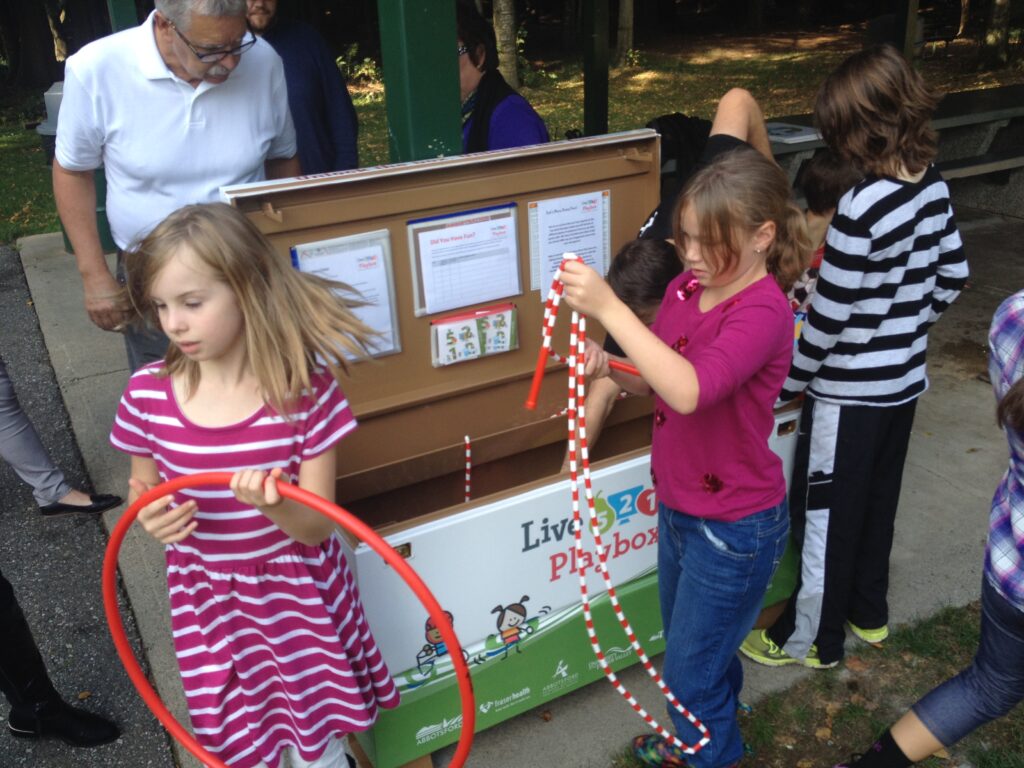Fraser Health (FH) delivers health services to more than 1.8 million people in the Lower Mainland, from White Rock and Burnaby east to Hope and Boston Bar. A diverse health authority with urban centres and rural communities, FH also has an association with 32 different bands that serve more than 38,000 members of Indigenous communities.
FH has agreements to structure the partnerships, data to help identify issues and set priorities, models of best practice, and the people power to assist communities to create change. Below, you will see how it works, what they can do for your community, who to contact, and a case study—the City of Surrey—of how these partnerships improve lives.
Fraser Health & Healthy Communities
Healthy Communities work plays an important part in FH’s health role, and they participate in this work through their Healthier Community Partnership (HCP) Initiative. Through this initiative, teams consisting of a medical health officer, a community health specialist, and the health authority’s executive director for the community—together called a ‘triad’—work together to offer their expertise, data, and best practices in support of community initiatives.
How does Fraser Health collaborate with local governments?
FH began the process of negotiating with municipalities to approve Healthier Community Partnerships (HCPs) in 2010, establishing their first HCP with the City of Langley in April 2010. Municipal council approval was obtained through delegations to municipal council; FH has found this process works well for both the local government and the health authority.
“This means we have a record of the agreement within the council minutes,” said Judi Mussenden, Population and Public Health Manager at Fraser Health. “We work with the partners involved to create terms of reference for our work together.”
Primarily a partnership between the local government and FH, the HCP usually includes the local school district and the Division of Family Practice as key members. Other partners vary in each community, though they typically include relevant community groups or non-profits all working together to achieve the HCP’s goal. This means that every HCP differs based on a community’s priorities, building flexibility into the HCP model—one of the model’s key strengths.
FH now has partnerships with all 20 municipalities within their region and has created Action Plans with 17 municipalities.
“The province calls the action plans Health Living Strategic Plans,” said Mussenden, “but that is an internal term. It is an agreement on the actions that we jointly identified through a strategic planning process.”
Healthier Community Partnership Structure
The three members of the FH triad on HCP—medical health officer, community health specialist, and the health authority’s executive director for the community—each bring a unique perspective to the HCP process, ensuring that community input, evidence-based process, and strategy are all at the table in the HCP process.
“The community health specialist,” said Ingrid Tyler, Medical Health Officer, “spends a significant part of their day participating on community tables, building relationships, and promoting health and community development.” Of the three members of the triad, the community health specialist will have the most interaction with community partners such as the RCMP Mental Health Officer, those leading the age-friendly community initiative, or the city’s social planner. Consequently, of the Fraser Health contingent, they are the most informed on health related issues and events in the community.
The medical health officer brings data, evidence, and population health strategic thinking.
“Every partner has a very distinct lens through which they view the world,” said Tyler, “they all see different parts of the community, different segments of the population, and all juggle other priorities than just health. The medical health officer can help with this by taking on a facilitative role.”
The executive director provides clinical operational expertise and guides strategic direction of local action related to health care services. They also often participate on community committees and act as a liaison to community.
The triad will usually meet once a month, and the community health specialist will spend a significant amount of time updating other members of the triad on their community activities, as well as the activity of partners.
“The community health specialist has the pulse of the community,” said Tyler.
The three perspectives come together during the triad’s meetings to discuss health issues in the community and explore how they can collaborate with other HCP partners to address the issues they have identified.
“In some cases,” said Tyler, “we have the luxury of discussing what will be on the Partnership’s agenda; in others, we may talk about how to bring the relevant partners together. As the MHO I might ask to meet with select partners who we think could take an action. It really varies in each community.”
Other than assisting local governments to make decisions and set priorities by sharing evidence and suggesting best or promising practices, FH also assists with facilitation, grant writing and Official Community Plan (OCP) amendments. In the case of OCPs, FH brings in the support of their Healthy Built Environment (HBE) partners to help create amendments that align with HBE principles.
In 2015, the City of Surrey had identified a need to take action in the area of childhood health. The City noted Chilliwack and Abbotsford’s success with the Live 5-2-1-0 program, which promotes healthy eating, reduced screen time, and physical activity. Surrey saw the program as a natural fit to bring together diverse partners around childhood health, and began to explore the program as an option. In March 2016, the City’s Chronic Disease Working Group received a Healthy Community Grant from Fraser Health, and in partnership with SCOPE brought the Live 5-2-1-0 program to Surrey.
Erin Balmer, Accessibility, Inclusion, and Health Promotion Coordinator for Surrey, stated that it was at an initial stakeholder meeting that the Working Group decided the best way to guarantee the success of the Live 5-2-1-0 initiative would be through a Community of Practice (CoP).
“It really is a group of community partners interested in making change—changes in programs and services for families and children ages 6-12 based on the Live 5-2-1-0 guidelines,” said Balmer, who is also co-facilitator of the CoP.
CoP partners include the City of Surrey and both the Parks and Recreation departments, the Surrey School District, YMCA’s Success, Big Brothers of Greater Vancouver, and the RCMP. The meetings of the CoP serve as a way of sharing best practices and success stories, as well as an opportunity for partners to ask for input on any challenges they have experienced. The group also discusses service or policy changes in relevant organizations. Balmer describes it as an opportunity to share and to brainstorm.
This CoP functions as a subcommittee of the Healthier Community Partnership, with the community health specialist (CHS) co-facilitating alongside Balmer. Through this, the CHS is also able to serve as a conduit between the Community of Practice and the HCP, conveying information about strategic direction, evidence and other matters of importance. This structure makes it easier for the Healthier Community Partnership to provide assistance to the CoP as needed, including spearheading grant opportunities.
Surrey’s success with the program was recognized in 2018, when they received a Pacific Blue Cross grant to support the program, increase its marketing capacity, and enhance programming through partnerships. The CoP partnered with a Surrey high school to develop youth ambassadors, and with Kwantlen Polytechnic University to engage nursing students directly with those high school students to develop curriculum and training. There have been many other successes in the short time the CoP have operated; find a list here.
Making partnerships work for your community
FH collaborates with your local government and community partners to improve the health of the people who live, work and play in your community. FH can assist local governments by providing relevant data, best practices and evidence-based policies to support local government’s action planning related to community health.
To get in contact with your local Healthier Community Partnerships team, you can contact your community health specialist. If you’re not sure who the community health specialist for your area is, contact Judi Mussenden, Population & Public Health Manager at Fraser Health. The PlanH Health Authority Contacts page has more contact information.




